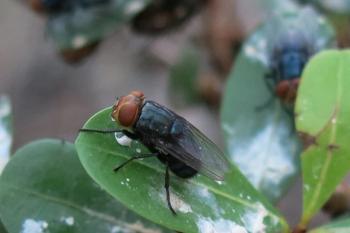
Profession fights slaughter bans
Washington — The veterinary profession is battling federal proposals that would eliminate funding for slaughter facility inspections and nix funds that administrate the sale of federally managed mustangs.
WASHINGTON — The veterinary profession is battling federal proposals that would eliminate funding for slaughter facility inspections and nix funds that administrate the sale of federally managed mustangs.
The U.S. House of Representatives struck down funding for the U.S. Bureau of Land Management's (BLM) sale program May 19 when it passed the Department of the Interior's budget bill for the fiscal year that begins Oct. 1.
BLM is required to sell its wild horses that are either more than 10 years old or have been passed over for adoption at least three times. The mandate was a rider on the omnibus 2005 appropriations bill that amended the Wild Horses and Burros Act of 1971. About 8,400 BLM-managed animals became eligible for sale under the new criteria, but two incidences that involved the slaughter of 41 government-owned animals prompted the BLM to discontinue selling wild mustangs in April.
Then in a move that garnered prominent media attention June 8, the House passed the U.S. Department of Agriculture's (USDA) budget bill for the same fiscal year with an amendment that eliminates funding for inspections at U.S. facilities that slaughter horses for human consumption.
Slaughter-ban advocates claim the amendments effectually will halt the practice of horse slaughter at the remaining three U.S. facilities (two in Texas and one in Illinois) but the veterinary profession worries about the care and welfare of the USDA-estimated 80,000 animals processed in this country each year.
"We don't consider slaughter as a desirable situation, but neither do we think that a life of abuse and neglect is a desirable situation," says Dr. Scott Palmer, president of the American Association of Equine Practitioners and proprietor of the New Jersey Equine Clinic in Clarksburg. "We always have opposed this type of legislation because closing those plants is not going to improve the lives of unwanted horses, and it's not going to reduce their numbers."
The proposals would expire Sept. 30, 2006, when the next fiscal year begins, but the year-long ban might be enough time for slaughter opponents to work on the passage of a permanent Slaughter Prevention Act (H.R. 503) which was reintroduced in the 109th Congress by Rep. John E. Sweeney, R-N.Y., who also championed the budget riders with colleagues Jack Spratt, D-S.C., Ed Whitfield, R-Ky, and Nick Rahall, D-W.V.
The AAEP, American Horse Council and American Veterinary Medical Association do not endorse H.R. 503, either, because murky language might unintentionally bar routine sales and transportation of horses, and funding shortfalls might relegate the animals to inadequate care.
"AVMA is concerned about the welfare of the horse. We're not in the debate as to whether or not you can eat horses," says Dr. Michael Chaddock, director of Governmental Relations for AVMA.
"There are slaughter plants in Canada and Mexico, and a lot of them will find their way to that slaughter channel, driven in trucks long ways," he says. "We're concerned about their welfare. If they're in the United States, slaughter is regulated by USDA. It's a legal activity here with oversight and regulations."
The fiscal year 2006 budget bills for the Department of Interior and USDA were still in Senate committees at presstime, and they were scheduled to come to the floor before the July 4 recess.
Sen. John Ensign, R-Nev., is expected to introduce the amendments on the floor of the Senate before the budget bills go to the floor for a vote, but the proposals will require a joint conference of House and Senate members if the language in the Senate bill fails to mirror the House version.
But many legislative observers are in the dark about what effect the budget riders will have on food safety and inspections.
"At this point, we probably have more questions than the USDA has answers," says Cindy Schonholtz, president of the Animal Welfare Council, which has been working closely with AAEP and AVMA to thwart the budget amendments under the umbrella of the Horse Welfare Coalition, which has at least 40 allied members. "We're a little unclear on if you take away the funding for the inspectors for the horse processing program, does than mean that plants can hire their own inspectors or does it mean that they will not be able to process horses for human consumption in the United States?"
Steven Cohen, spokesperson for the USDA's Food Safety Inspection Service, declined to comment on pending legislation.
Newsletter
From exam room tips to practice management insights, get trusted veterinary news delivered straight to your inbox—subscribe to dvm360.




